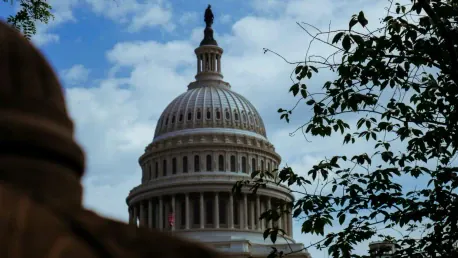In an unprecedented event, armed officers from the Department of Homeland Security (DHS) barred Oregon U.S. Representative Suzanne Bonamici and about 20 other Democratic Congress members from entering the U.S. Department of Education building. This dramatic blockade occurred as the lawmakers sought a meeting with the acting director of the department, Denise Carter, to discuss alarming reports that President Donald Trump was poised to issue an executive order dismantling the agency—an action that typically requires Congressional approval. The confrontation has garnered widespread attention, casting light on the increasing tensions between Congressional oversight duties and executive decisions under the Trump administration.
Lawmakers’ Quest for Accountability
The broader context surrounding this incident points to a heightened strain between Congressional oversight responsibilities and executive actions, specifically those involving the Trump administration. Throughout the same week, lawmakers were obstructed from entering other federal buildings, such as the U.S. Treasury and U.S. Agency for International Development, reflecting a disturbing trend. These repeated blockades are seen by many Democratic lawmakers as not just policy disagreements but actions that challenge fundamental principles of governmental operation and oversight. It is indicative of what some perceive as the executive branch’s attempt to erode established checks and balances.
Representative Suzanne Bonamici, a key figure in education policy owing to her service on important committees, consistently underscores the critical role of the U.S. Department of Education. The department’s responsibilities include administering federal student loans, providing targeted funding, and enforcing anti-discrimination laws. For states like Oregon, the federal department is indispensable, contributing roughly 14% of the state’s education budget, amounting to over $1 billion annually. Such funds are crucial for supporting students living in poverty and those with disabilities, highlighting the significant impact that any executive action to dismantle the department could have on vulnerable student populations.
Confrontation at the Federal Building
Bonamici, together with her colleagues, had previously penned a letter to Denise Carter seeking to set up a meeting to discuss their growing concerns. When they arrived at the Department of Education, they were met with an unexpected and contentious blockade. The scene was described as tense, with video evidence shared by Florida Congressman Maxwell Frost showing officers and a plainclothes administrator physically blocking the entry of the elected officials. This hostile encounter left the lawmakers feeling insulted and astonished by the lack of access to a public building. There were no responses from the acting director or any other federal education representatives regarding the legal grounds or the specific orders that sanctioned the blockade.
Representative Bonamici later expressed the abnormality and distressing nature of the situation, pointing out its broader implications for democratic governance and public accountability. The incident was not just a minor hurdle but a significant statement on the state of government processes and the perceived erosion of the sacrosanct principle of Congressional oversight. The blockade highlighted the mounting discord between the executive and legislative branches, spotlighting the growing divide and mistrust within the federal government.
Implications for Democratic Governance
Reflections on the event bring to light the severity and implications of such actions on democratic governance and public accountability. It exemplifies a concerning trend under the Trump administration to centralize power and reduce federal oversight, often in tandem with advisors like Elon Musk, who have shown support for curtailing parts of federal bureaucracy. This growing centralization and reduction in checks and balances have become focal points of resistance for lawmakers like Bonamici, who are determined to maintain governmental transparency and accountability.
The efforts by Bonamici and her colleagues to confront and navigate these blockades underscore the ongoing struggle to uphold democratic principles amidst shifting political landscapes. Their persistent attempts to exercise oversight reflect the critical balance of power necessary for a functioning democracy. This incident serves as a microcosm of the broader efforts by Congressional members to resist the centralization and unilateral actions by the executive branch.
Future Considerations and Actions
In an unprecedented event, armed officers from the Department of Homeland Security (DHS) prevented Oregon U.S. Representative Suzanne Bonamici and about 20 other Democratic Congress members from entering the U.S. Department of Education building. This dramatic incident unfolded as the lawmakers were seeking a meeting with the department’s acting director, Denise Carter, to discuss concerning reports that President Donald Trump was poised to sign an executive order dismantling the agency—an action that would normally require Congressional approval. The confrontation highlights the escalating tensions between Congressional oversight responsibilities and executive decisions during the Trump administration, drawing widespread attention across the political landscape. This incident underscores the broader issues of checks and balances within the government, reflecting the ongoing struggle between different branches over the authority and direction of federal agencies. The situation poses significant questions about the extent of executive power and its impact on established democratic processes.









